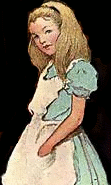Through the Looking Monitor: Alice in Wikiland
 references
references
Barton, M. D. (2004). Embrace the Wiki Way! Matt Barton’s TikiWiki. 21 May 2004. Retrieved May 04, 2008, from http://www.mattbarton.net/tikiwiki/tiki-read_article.php?articleId=4
Barton, M. & Cummings, R.E. (2008). Preface. In Cummings, R. E. & Barton, M. (Eds.) (2008). Wiki writing: Collaborative learning in the college classroom.(p. vii-xv). Ann Arbor: University of Michigan Press.
Berlin, J. (1988). Rhetoric and Ideology in the Writing Class. College English 50, 477-494.
Bitzer, L. F. (1968). The rhetorical situation. Philosophy and Rhetoric. pp. 1-14.
Bizzell, P. (1987). What is a Discourse Community? Penn State Conference on Rhetoric and Composition. University Park.
Blair, K. (1998). Literacy, Dialogue and Difference in the ‘Electronic Contact Zone.’ Computers and Composition. 15, 31-329.
Bruffee, K. A. (1984). Collaborative Learning and the ‘Conversation of Mankind.’ College English 46, 635-52.
Cummings, R. E. & Barton, M. (Eds.) (2008). Wiki writing: Collaborative learning in the college classroom. Ann Arbor: University of Michigan Press.
Ede, L. & Lunsford A., (1984). Audience Addressed/Audience Invoked: The Role of Audience in Composition Theory and Pedagogy. College Composition and Communication 35, 155-171.
Farrell, T., (1976). Knowledge, Consensus, and Rhetorical Theory. In Lucaites J. L., Condit C. M., & Caudill S. (Eds.), Contemporary Rhetorical Theory: A Reader (pp. 140-152). New York: Guilford Press.
Farrell, T. (1991). Practicing the Arts of Rhetoric: Tradition and Invention. In Lucaites J. L., Condit C. M., & Caudill S. (Eds.), Contemporary Rhetorical Theory: A Reader (pp. 79-100). New York: Guilford Press.
Ferris, S., and H. Wilder. 2006. Uses and Potentials of Wikis in the Classroom. Innovate 2 (5), Retrieved on May 04, 2008 from, http://www.innovateonline.info/index.php?view=article&id=258&action=article
Garza, S. L. & Hern T,. (2005). Using Wikis as Collaborative Writing Tools: Something Wiki This Way Comes-or Not! Kairos 10(1), Retrieved May 04, 2008, from http://english.ttu.edu/kairos/10.1/binder2.html?http://falcon.tamucc.edu/wiki/WikiArticle/Home
Glaser, A. & Ebersbach M., (2004). Towards Emancipatory Use of a Medium: The Wiki. International Journal of Information Ethics, 2, 1-9. Retrieved May 04, 2008, from http://container.zkm.de/ijie/ijie/no002/ijie_002_09_ebersbach.pdf
Grant, L. (2006). Using Wikis in Schools: A Case Study. Retrieved May 04 2008, from http://www.futurelab.org.uk/research/discuss/05discuss01.htm
Habermas, J. (1975). Legitimation Crisis. Toronto: Beacon.
Harris, J. (1989). The Idea of Community in the Study of Writing. College Composition and Communication 40, 11-22.
Herrick, J. A. (2001). The History and Theory of Rhetoric: An Introduction. (2nd Ed.). Boston: Allyn and Bacon.
Kimball, M. (2006). “30 November 2006 Posting.” WPA-L. Writing Program Administration Listserv, 3 Feb. 2007. http://lists.asu.edu/archives/wpa-l.html.
Kitalong, K. Bridgeford, T., Moore, M. & Selfe, D. (2003). Variations on a theme: The technoogy autobiography as a versatile writing assignment. In P. Takayoshi, & B. Huot, (Eds.) (2003). Teaching Writing with Computers: An Introduction. (pp. 219-233). Boston: Houghton Mifflin.
Lamb, B. (2004). Wide open Spaces: Wikis Ready or Not. EDUCAUSE Review, 39(5), 36–48.
Lunsford, A.A. & Ede, L. (1996). Representing audience: ‘Successful’ discourse and disciplinary critique. College Composition and Communication 47(2), pp.167-179.
Lunsford, A.A. & Ede, L. (2009). ‘Among the audience’: On audience in an age of new literacies. In M. E. Weiser, B. M. Fehler, & A. M. Gonzalez (Eds.). (2009). Engaging audience: Writing in an age of new literacies. (pp. 42-72). NCTE.
Mauk, J. (2003). Location, Location, Location: The ‘Real’ (E)states of Being, Writing, and Thinking in Composition. College English 65, 368–88.
Murray, D. (1970). The Interior View: One Writer's Philosophy of Composition. College Composition and Communication 21, 21-26.
Murray, D. (1982). Teaching the Other Self: The Writer's First Reader. College Composition and Communication 33, 140-147.
Nelson, Thomas J. (2008). Writing in the wikishop: Constructing knowledge in the electronic classroom. In R. E. Cummings & M. Barton (Eds.) (2008). Wiki writing: Collaborative learning in the college classroom. (pp. 194-203). Ann Arbor: University of Michigan Press.
Ong, W. J., (1975). The Writer’s Audience Is Always a Fiction. PMLA 90, 9-21.
Payne, D. (2005). English Studies in Levittown: Rhetorics of Space and Technology in Course-Management Software. College English 67, 483-507.
Perelman, C. & Olbrechts-Tyteca L. (1969). The New Rhetoric: A Treatise on Argumentation. Notre Dame, Indiana University.
Porter, J. (1986). Intertextuality and the Discourse Community. Rhetoric Review 5, 34-47.
Reynolds, N. (1998). Composition’s Imagined Geographies: The Politics of Space in the Frontier, City, and Cyberspace. College Composition and Communication 50, 12–35.
Selber, S. A. (2004). Multiliteracies for a Digtial Age. Carbondale, IL: Southern Illinois University Press.
Selfe, C. L. & Selfe R. J. Jr., (1994). The Politics of the Interface: Power and Its Exercise in Electronic Contact Zones. College Composition and Communication 45, 480–504.
Selfe, R. Techno-pedagogical explorations: Toward a sustainable technology-rich instruction. In P. Takayoshi & B. Huot (Eds.), Teaching Writing with Computers: An Introduction. (2003). Boston: Houghton Mifflin.
Soja, E. (1989). Postmodern Geographies: The Reassertion of Space in Critical Social Theory. New York: Verso.
Takayoshi, P. and B. Huot. (Eds.). (2003). Teaching Writing with Computers: An Introduction. Boston: Houghton Mifflin Company.
Trimbur, J. (1989). Consensus and Difference in Collaborative Learning. College English 51, 602-616.
Tulley, C. & Blair K. (2003). E-Writing Spaces as Safe, Gender-Fair Havens: Aligning Political and Pedagogical Possibilities. In P. Takayoshi & B. Huot (Eds.) Teaching Writing with Computers: An Introduction. (2003). Boston: Houghton Mifflin.
Vie, S. & deWinter, J. (2008). Disrupting intellectual property: Collaboration and resistance in wikis. In Cummings, R. E. & Barton, M. (Eds.) (2008). Wiki writing: Collaborative learning in the college classroom. (pp. 109-122). Ann Arbor: University of Michigan Press.